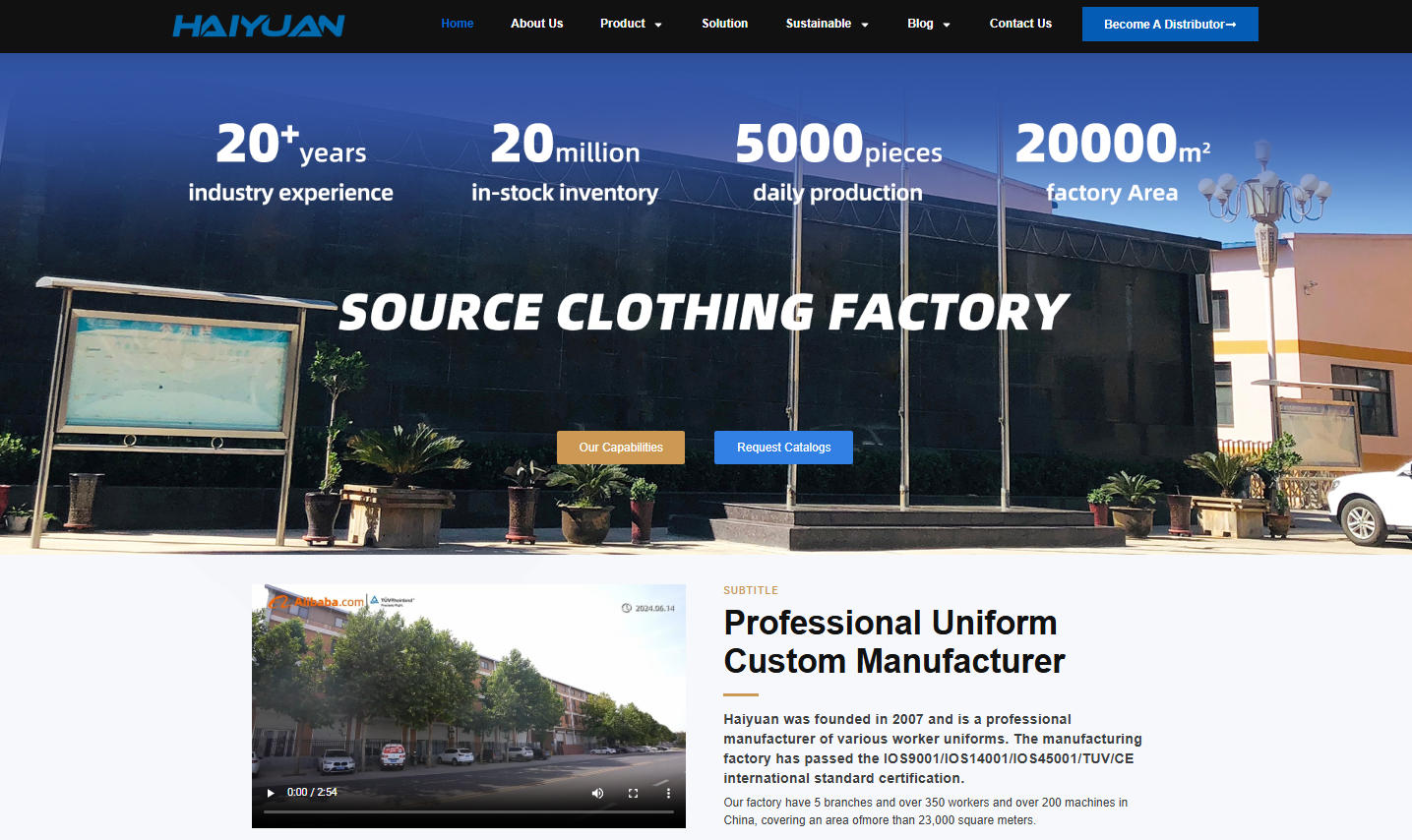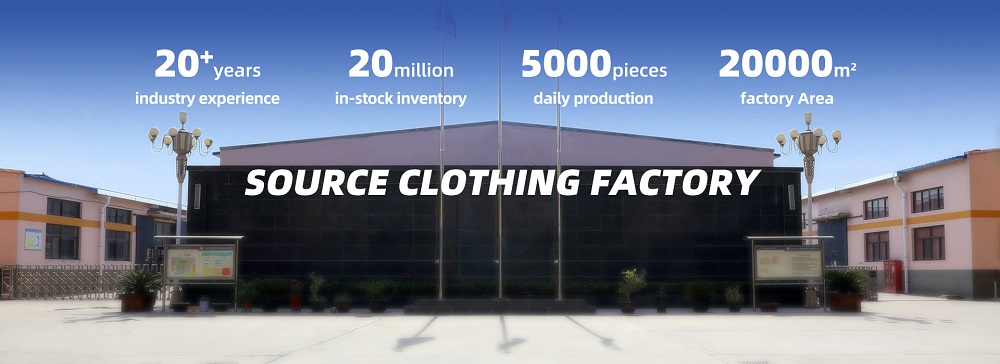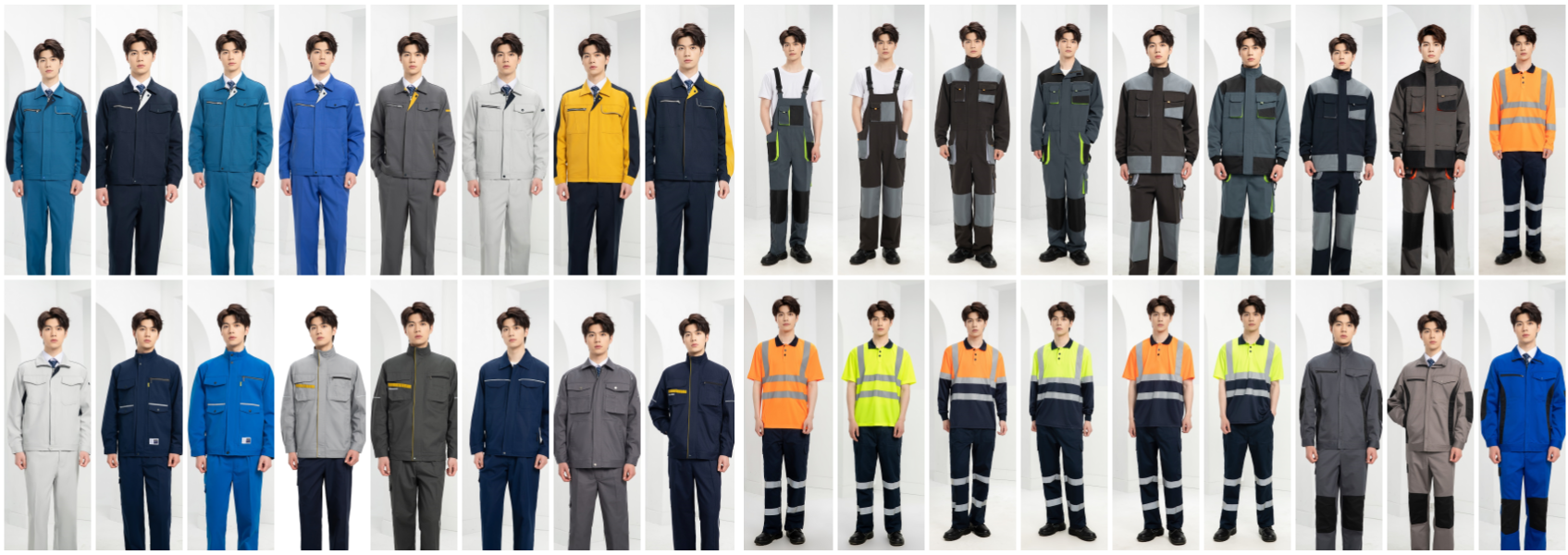Finding the “best” workwear wholesaler in China depends on your specific needs, budget, purchase volume, and requirements for quality, service, and certification. There is no absolute single “best”, but the following directions can help you find the most suitable, professional, and cost-effective supplier:
Core Strategy: Lock in Industrial Belts + Professional Platforms + Strict Screening
Ⅰ. Focus on core industrial belts (concentration of source factories, high cost performance)
Shandong (Jining, Binzhou, Zibo, Qingdao):
Advantages: China’s largest labor protection and workwear industry cluster, especially famous for anti-static clothing, protective clothing, flame-retardant clothing, and general workwear. The industrial chain is extremely complete, with a one-stop solution from fabrics to finished products, many manufacturers, fierce competition, and prices are usually the most advantageous.
Representative categories: work clothes for petrochemical, electronics, medical, food processing and other industries; special protective clothing.
Key areas: Jining Zoucheng (famous labor protection town), Binzhou Huimin (rope net, protection), Zibo Zhoucun.
Jiangsu (Nantong, Suzhou, Changzhou):
Advantages: The textile industry has a solid foundation and excels in high-end workwear, professional attire, and fashionable work clothes.Strong fabric R&D capabilities, fine workmanship, and novel styles. Suitable for companies with high image requirements (such as hotels, finance, and high-end manufacturing).
Representative categories: Suit-style workwear, shirts, POLO shirts, high-end custom workwear, functional fabric workwear (breathable, moisture wicking).
Key Areas: Nantong (home textiles, textiles), Changshu (clothing), Wujiang (fabrics).
Zhejiang (Ningbo, Wenzhou, Yiwu, Hangzhou):
Advantages:A major clothing manufacturing province,Fast response, flexible small batches, and mature e-commerce supporting facilities.Yiwu is a global distribution center for small commodities, and also has a large number of workwear wholesalers. Wenzhou is famous for men’s clothing and leather shoes, and also radiates workwear.
Representative categories:Ordinary work clothes, T-shirts, jackets, aprons, chef uniforms, small and medium batch customization.
Key Areas: Yiwu International Trade City (Industrial Clothing Area), Ningbo.
Hebei (Shijiazhuang, Baoding, Cangzhou):
Advantages: Traditional base for labor protection products,Especially around Shijiazhuang, there are a large number of labor protection product manufacturers,Highly price competitive.Suitable for purchasing basic work clothes and labor protection clothing (such as work jackets and pants).
Representative categories: Cotton-padded clothes, overalls, ordinary work suits, labor protection gloves and other supporting products.
Key Areas: Shijiazhuang and its surrounding counties and cities (such as the Shijiazhuang Haiyuan Labor Protection Products Company you mentioned earlier belongs to this industrial belt).
Fujian (Quanzhou, Shishi):
Advantages: Strengths in sports/leisure fabric workwear and jacket-style workwear.The sports footwear and apparel industry chain is complete and it excels in the application of functional fabrics.
Representative categories: Outdoor work clothes, security clothes, jackets, and work clothes that require sports functions.

Ⅱ. Efficient channels for finding wholesalers
B2B Platform (Preferred):
1688.com (Alibaba Domestic Site): Absolute main force! It brings together the source factories and large wholesalers of various industrial belts across the country. Search keywords such as “wholesale of work clothes”, “customized work clothes”, “labor protection clothing manufacturers” + subdivided categories (such as “anti-static work clothes“, “chef clothes”) + place of origin (such as “Shandong work clothes”). Use screening tools (select “manufacturer” for business model, check the strength of merchants, years of credit pass, transaction records, and buyer evaluation). This is the core way to find the most cost-effective supplier.
Alibaba International Station: If the manufacturer involves export or has foreign trade experience, you can also check it out, but the price may be slightly higher.
HC360, Made-in-China.com: The old platform can also be used as a supplement.
Professional Industry Exhibition:
China Industrial Protection Products Fair (CIOSH): The largest and most professional industrial protection exhibition in Asia, held twice a year in spring and autumn (Shanghai and other places). It brings together the country’s top manufacturers and wholesalers of workwear and protective clothing, and is an excellent opportunity to understand industry trends, compare suppliers, and negotiate directly.
Related industry exhibitions: For example, textile fabric exhibitions, clothing equipment exhibitions, etc. may also have workwear companies participating.
Search Engines and Vertical Industry Websites:
Baidu search: keywords + “manufacturer”, “wholesale”, “production base” (be careful to distinguish between advertisements and real manufacturers).
Find a specialized portal or yellow pages for the workwear and labor protection industries.
Government/Association Recommendation:
Contact the commerce bureau, industry federation or labor protection products industry association in the location of the target industrial belt. They often have a list of high-quality local companies.
Ⅲ. Key Criteria For Selecting The “Best” Supplier (Must Read To Avoid Pitfalls)
Clarify Your Own Needs (Most Important!):
Category and use: Ordinary work clothes? Special protective clothing (anti-static, flame retardant, chemical protection, etc.)? Professional clothing? Chef clothing? Quantity required (MOQ)? Customization degree (logo embroidery/printing, special size)?
Quality requirements: Durability, fabric composition, workmanship standards (thread ends, stitch density)? Are specific national standards (GB) or industry standards required? Are international certifications (CE, ANSI) required?
Budget range: Be clear about your psychological price point, you get what you pay for.
Delivery time: Are there strict requirements?
Core screening dimensions:
Factory strength (non-trader): Priority is given to “manufacturer” (screened on 1688). Requirements:
Factory real scene photos/videos: Workshops, equipment, warehouses.
Business license: Verify business scope, registered capital, and years of establishment.
Production license/qualification: For specific products (such as special protective clothing), you need to check the corresponding industrial product production license, etc.
Capacity Assessment: Can it meet your order quantity and delivery time? On-site factory inspection is the most reliable way!
Professionalism and experience:
Are you focused on the field of workwear/labor protection? Do you have experience and successful cases in producing the products you need?
Are you familiar with relevant industry standards and regulations (such as the GB standard for special protective clothing)?
Quality Assurance System:
Are there any quality inspection procedures and laboratories? Can you provide quality inspection reports?
Sample quality: Be sure to proof! Pay a reasonable proofing fee and strictly evaluate the sample material, workmanship, size, color difference, and functionality (if necessary). The quality of the bulk product should not be lower than the sample.
Certification (Important!):
Ordinary tooling: Generally, it is necessary to comply with the National Basic Safety Technical Specifications for Textiles (GB 18401).
Special protective clothing: must! Check the valid “Safety Mark Certificate for Special Labor Protection Products” (LA Certification) and the corresponding test report. Be sure to verify the authenticity through official channels (Safety Mark Management Center for Special Labor Protection Products)! Other certifications such as flame retardant, anti-static, acid and alkali resistance also need to be verified.
Price and cost performance:
Get a detailed quotation (including fabrics, accessories, processing fees, packaging, taxes, and MOQ).
Compare multiple: Compare prices under the same quality, service and certification requirements. Be wary of quotations that are far below the market price.
Service and Communication:
Is the response timely? Is the communication smooth (it is best to have a contact person who understands the professional terminology)?
Can you provide value-added services such as design suggestions, LOGO production plans, size solutions, etc.?
What is the after-sales policy? (such as handling of defective products)
Flexibility of cooperation model:
Is the minimum order quantity (MOQ) acceptable? Do you support small batch trial orders?
What are the customization capabilities?
Is the payment method (usually deposit + final payment) reasonable?
IV. Suggestions on the investigation of Shijiazhuang Haiyuan Labor Protection Products Co., Ltd. (combined with the previous article)
Advantages (meet some of the characteristics of a “good wholesaler”):
geographical cost: Located in Hebei Labor Protection Industry Belt,The labor and other costs are lower, which may have price advantages.
Industrial Support: The surrounding supply chain is relatively mature.
Focus Areas: Mainly engaged in labor protection products, we have accumulated experience in tooling production.
Domestic sales basis: Familiar with the domestic market.
Must be rigorously examined (to determine if it is the “best”/suitable for you):
Is it a real factory? We strongly request factory inspection (on-site or video) to check the equipment, workers, production process, work-in-progress, and warehouse.This is the core!
Specific product matching: Are its superior products exactly what you need? (Ordinary workwear, cotton clothing, pants? Or do you need special protective clothing?)
Quality Control: Inspect the quality inspection process on site, request quality inspection reports, and strictly evaluate samples.
Certification qualifications: If safety protection is involved, the authenticity and validity of special protection certificates such as LA certification must be 100% verified!Log in to the official platform to check.
Export capability (if required): Do you have experience? Can you meet foreign standards/certifications?
Comprehensive cost performance: Compared with similar manufacturers in Shandong, Jiangsu and other places, what is their overall competitiveness in price, service and delivery time under the same quality and certification requirements?
V. Summary and Recommendations for Action
Define Your “Best”: Clearly list your needs priorities (price > quality > style > service > certification?).
Locking in the industrial belt: Select the main area according to demand (Shandong – comprehensive cost-effectiveness/protective clothing; Jiangsu – high-end/professional clothing; Hebei – basic work clothes/labor protection; Zhejiang – flexible small orders; Fujian – functional sports style).
1688 Deep Digging: Within the target industrial belt, select “manufacturers” on 1688, carefully study the store information, products, reviews, qualifications, and conduct a large number of inquiries and comparisons.
Sample request and factory inspection: For potential suppliers, insist on paying the proofing fee to obtain physical samples for evaluation. For important or large orders, be sure to conduct on-site factory inspections (or entrust a professional third-party inspection company), which is the most effective way to avoid pitfalls.
Verification and certification: For special protective clothing, official channel verification certification is a legal and safety requirement!
Contract protection: All details (specifications, standards, quantity, price, delivery date, payment, inspection, liability for breach of contract) are written into the formal contract.
Consider Shijiazhuang Haiyuan: It can be included in the inspection list as one of the candidates for the Hebei Industrial Belt, but the screening process in points 3, 4, and 5 above must be strictly followed, and a decision can only be made after sufficient comparison with suppliers in Shandong and other places.
The “best” workwear wholesaler is a reliable source factory that can stably provide products that meet your specific needs (quality, price, delivery, service, certification). The key to success lies in going deep into the industry belt, using professional platforms, strict screening and verification (especially samples and factory inspections), and clear positioning of your own needs. I wish you find your ideal partner!




